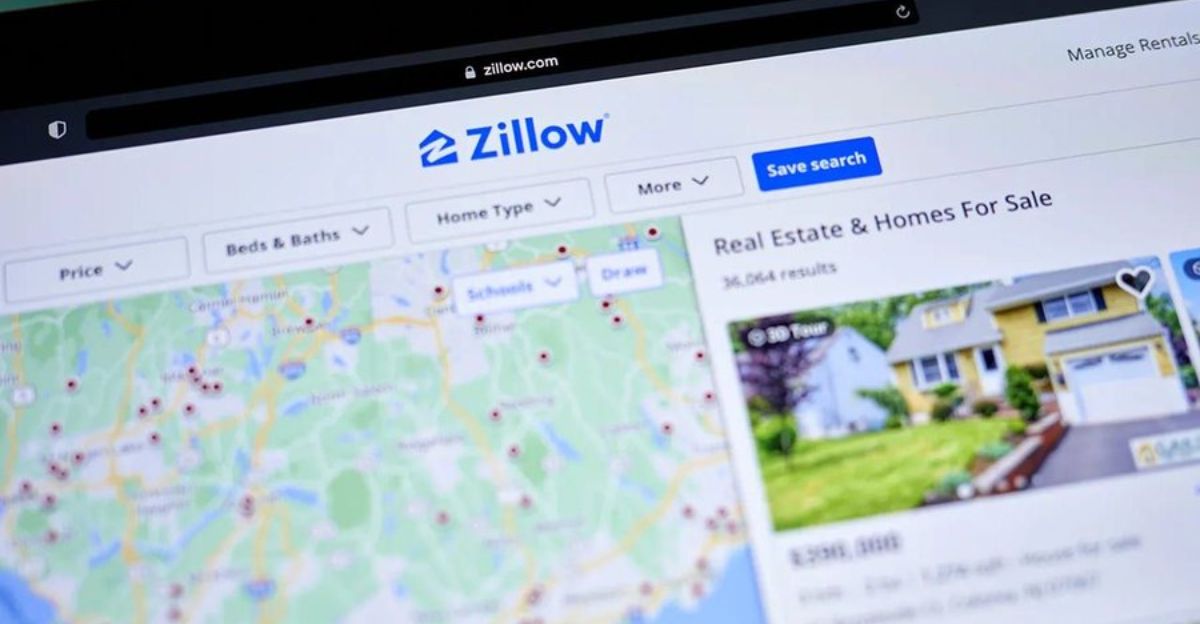
Zillow rolled out new listing rules on June 30, 2025, without much fanfare. The company now bans properties from its platform if they’re marketed elsewhere for more than 24 hours first.
This move impacts thousands of listings each week, especially in cities like Miami and San Francisco. According to CNN and HousingWire, agents and homebuyers are bracing for big changes. And this is only the beginning, things are about to get messier.
Zillow’s Massive Reach

Between 227 and 243 million people visit Zillow’s platforms each month, making it the most popular real estate site in the U.S. It’s where most Americans begin their home search.
In fact, 100% of homebuyers use the internet during their search, and nearly half start online as their very first step. That means any change to Zillow’s platform has the power to reshape how millions of people buy and sell homes.
A Glimpse Into Europe’s Mess

Some experts warn the U.S. market could splinter like Europe’s. Over there, there’s no single listing database. In Italy, for example, buyers have to walk from one brokerage office to another just to check what’s for sale.
This kind of scattered system causes confusion and delays, something most American buyers have never had to deal with. But if major platforms start pulling listings, that kind of chaos could be coming here too.
Compass Keeps Homes Off the Radar

Compass, one of the nation’s biggest brokerages, has created a private network where homes are marketed before they’re listed publicly. By early this year, over half of its listings were being sold this way.
Many of these homes never make it to the MLS or appear on sites like Zillow. That gives Compass more control over inventory, but it also leaves regular buyers in the dark unless they know exactly where to look.
Zillow Cracks Down

Zillow officially began enforcing its listing rules on June 30, 2025. The penalties are serious: after just three violations, agents can be permanently banned from both Zillow and Trulia.
Hundreds of listings are now being removed each week, especially in markets where competition is fierce. For agents, it’s a wake-up call. And for buyers, it means some homes might vanish from the search results overnight.
Europe Shows What’s at Stake

France is a clear example of what market fragmentation looks like. The country’s top property site draws over 100 million visits a month, but it’s not enough. Buyers still have to check several other sites to see everything available.
In Portugal, it’s the same story. Users bounce between Idealista, Imovirtual, and other platforms to cover all their options. Without one central hub, house hunting turns into a confusing and time-consuming process.
Buying a Home Blindfolded

Brian Boero, CEO of a real estate consulting firm, tried to buy a home in Italy and described the experience as “feeling around in the dark.” He had to walk from town to town, staring at brokers’ window displays.
“It was shadowy, confusing,” he said. “We really didn’t feel like we were in control of the process.” His story mirrors what many fear could happen in the U.S. if listings become scattered and harder to find.
Compass Fights Back in Court

On June 23, 2025, Compass filed a federal antitrust lawsuit against Zillow. The brokerage claims Zillow’s new policy is monopolistic and violates antitrust laws.
Zillow attracts around 227 million unique visitors monthly. Compass argues that agents can’t afford to miss out on that kind of exposure. The lawsuit could reshape who holds power over real estate listings across the country.
Global Leaders Step In

This September, leaders from more than 50 countries will gather in Toronto for the International MLS Forum. Their goal: find ways to protect open access to property markets worldwide.
Countries like Egypt have already launched national real estate systems, while France’s SNPI is pushing for standardized listing data. Many experts believe that changes in U.S. data policy could ripple across borders and change how real estate is marketed around the world.
Compass Opens the Vault

In July, Compass made a surprise move. The brokerage announced it would let rival firms and MLSs access more than 6,000 off-market listings, but only under strict conditions.
To qualify, others must agree not to alter or monetize the listings and must keep the original agent featured. It’s a step toward more transparency, but not full openness. Most of these homes were previously visible only to Compass agents or private clients.
Agents Push Back

Realtor Jennifer Knoll says she received three warnings from Zillow after listing homes on Compass before posting to the MLS. Under the new rules, a third violation could mean a permanent ban.
Many agents now feel stuck. They’re trying to do what’s best for their clients while also staying compliant with fast-changing platform policies. The tension is growing, and agents across the country are speaking out.
More Platforms, More Headaches

The listing battle is expanding. Redfin has started preparing to enforce its own version of Zillow’s ban. Meanwhile, Homes.com is welcoming the banned listings with open arms.
As a result, real estate listings are splintering across competing sites. Buyers must now bounce between platforms just to keep up. What used to be a simple search could soon become a multi-site scavenger hunt.
Tech Tries to Fix It

Some tech groups are working behind the scenes to hold the market together. One key solution is RESO’s Web API, which helps platforms share listings more easily. Adoption has grown from 3% in 2019 to over half the industry by 2025.
Still, experts like RESO CEO Sam DeBord warn that if brokerages hoard data and platforms block access, centralized listings could collapse. That would hurt competition, and homebuyers most of all.
The Numbers Don’t Lie

Private or “pocket” listings still represent a small portion of U.S. home sales in 2025, though exact figures remain elusive. Zillow’s research found these off-MLS homes sold for nearly $5,000 less on average. Compass claims its pre-marketed homes sold for 2.9% more, but offers no third-party validation. The data reveals a growing divide in listing strategies and transparency.
A Final Warning

Ali Attar, CEO of Realtyna, says Americans are underestimating the value of centralized access: “As soon as they destroy it, bringing it back will be extremely difficult.” With more listings hidden behind private walls, experts warn that a fractured system is already taking shape, one that may prove hard, if not impossible, to undo.
Washington Watches Closely

The National Association of Realtors remains under investigation as the DOJ continues its antitrust probe into real estate data policies. A Supreme Court ruling in early 2025 cleared the way. At stake is the future of centralized listings, whether the U.S. stays unified or ends up like Europe, where fragmented databases frustrate buyers and sellers alike.
The Stakes Are High

Europe’s property markets offer a warning. Investment volumes dropped 45% in 2024 amid economic pressures and opaque market structures. Analysts fear the same fate could await the U.S. if listings become too fragmented, hurting liquidity, driving down values, and making real estate harder to navigate for investors and families alike.
Buyers Feel the Pain

Zillow’s new 24-hour rule aims to help consumers, but critics say it may push big brokerages to list privately instead. Buyers now face the prospect of checking multiple platforms, Compass, MLS, Zillow, and more, just to view what’s available. The shift toward a “cyberquest” is real, and it’s only getting more complex.
Real Estate’s Streaming Problem

As brokerages wall off their listings, the market begins to resemble streaming entertainment: every company wants its own app, its own audience, and its own turf. Just as viewers juggle subscriptions, buyers may soon need logins for Compass, Zillow, Redfin, and beyond, making the home search fragmented and frustrating.
Where We Go From Here

America’s $45 trillion housing market is at a turning point. If Zillow and Compass can’t find common ground, the country may lose its one-stop shop for home listings.
This isn’t just an industry feud; it’s a battle over who controls the future of home buying. As platforms and brokerages clash, buyers and sellers are the ones caught in the middle.